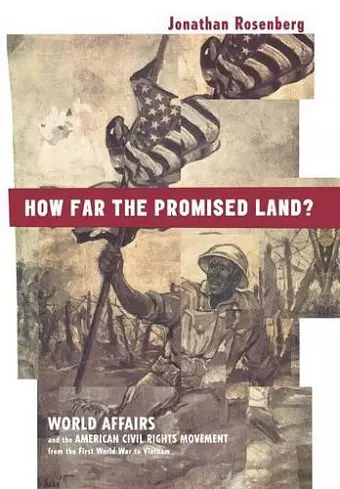How Far the Promised Land?
World Affairs and the American Civil Rights Movement from the First World War to Vietnam
Format:Hardback
Publisher:Princeton University Press
Published:8th Nov '05
Currently unavailable, and unfortunately no date known when it will be back

A fascinating account of the role of internationalism in race reform discourse... An important contribution to the literature on race and international affairs and the growing body of work on internationalism in American reform politics. How Far the Promised Land is essential reading for civil rights scholars and for scholars interested in international approaches to American history. -- Mary L. Dudziak, University of Southern California, author of "Cold War Civil Rights: Race and the Image of American Democracy" In his introduction to this innovative and engaging history, Jonathan Rosenberg argues that we cannot fully understand the twentieth-century civil rights movement if we do not understand exactly how its leaders and laity made sense of, and use of, international affairs. He goes on to demonstrate, in great and effective detail, just how they made sense and use of international affairs, and how the relationship between civil rights and international affairs has shaped our history. Rosenberg writes clearly, crisply, and vividly. He has an ear for unforgettable quotes--the voices of his subjects ring loudly and give the story its force--and an eye for moving human drama. -- James Goodman, Rutgers University, author of "Stories of Scottsboro" Jonathan Rosenberg amply proves his thesis that race reformers from World War I on were acutely aware of a variety of international issues, and that they incorporated references to events overseas in their arguments for racial progress in America. He has done a wonderful job of assembling a convincing collection of quotations that attest to the cosmopolitan view of race reformers, particularly those in the NAACP, and he demonstrates the importance of international consciousness over a longer time period and in much greater detail than have others. -- Frank Costigliola, University of Connecticut, author of "France and the United States: The Cold War Alliance since World War II"
Explores the relationship between overseas developments and the most important reform movement in modern American history, the struggle for racial justice. This book argues that civil rights leaders were interested in the world beyond America and incorporated their understanding of overseas matters into their reform program.How Far the Promised Land? explores the relationship between overseas developments and the most important reform movement in modern American history, the struggle for racial justice. Interweaving civil rights history, U.S. foreign relations history, and twentieth-century international history, the book contributes to the emerging effort to reconceptualize the study of America's past by locating it in a global context. In examining the link between international developments and the quest for racial justice, Jonathan Rosenberg argues that civil rights leaders were profoundly interested in the world beyond America and incorporated their understanding of overseas matters into their reform program in order to fortify and legitimize the message they presented to their followers, the nation, and the international community. The book considers how a cosmopolitan group of black and white, male and female race reform leaders purposively deployed World War I and the peace settlement, the decolonization struggles in Africa and Asia, the emergence of communism and fascism, World War II, and the Cold War to help realize their domestic aspirations. Rosenberg sets this complex story against the backdrop of America's growing activism on the world stage, a development that would have significant positive implications for the domestic struggle. Central to the work is the notion that race reform leaders were animated by the idea of "color-conscious internationalism," a distinctive outlook that would affect the trajectory and momentum of the civil rights movement.
"Jonathan Rosenberg, describing 'color-conscious internationalism', demonstrated how the men and women who struggled to win equality for black Americans used world affairs--and especially wars--to advance their cause... Rosenberg does a superb job of analyzing the interplay of world affairs and the quest for racial justice in the United States from 1914 to the 1960s."--Warren I. Cohen, International History Review
ISBN: 9780691007069
Dimensions: unknown
Weight: 624g
336 pages